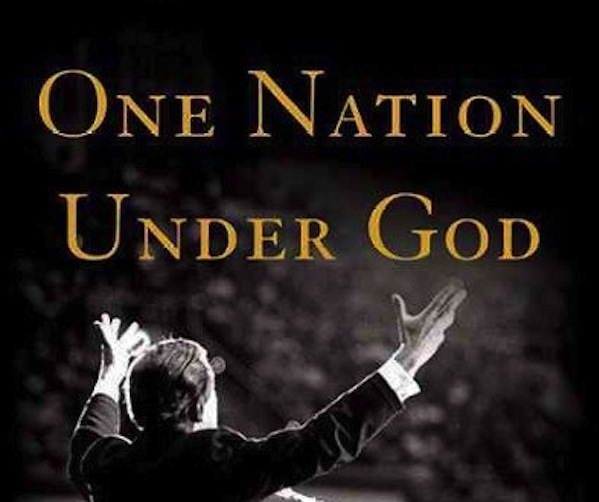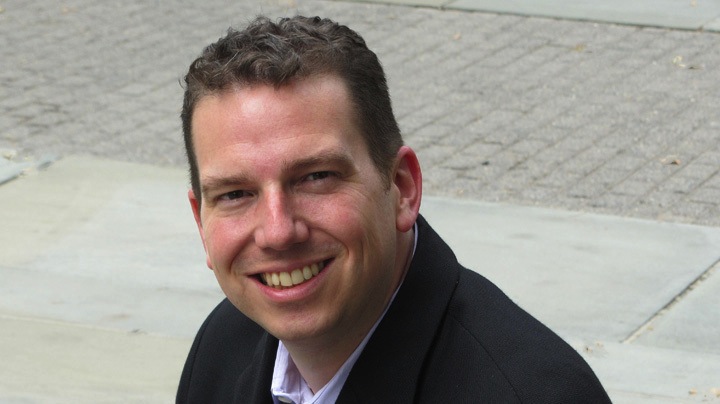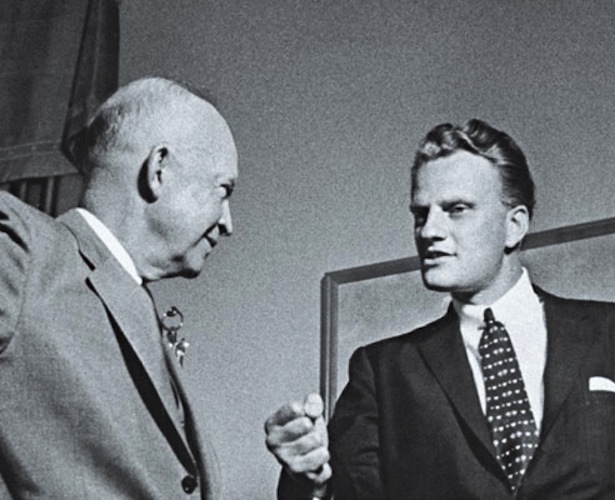Book Interview: When Did America Become a Christian Nation?
“Yes, America might have been a nation of Christians, but that was different from being formally a Christian nation.”
One Nation Under God: How Corporate America Invented Christian America by Kevin M. Kruse. Basic Books, 352 pages, $29.99.

By Blake Maddux
Kevin Michael Kruse completed his bachelor’s degree at the University of North Carolina at Chapel Hill under the mentorship of the eminent American historian William E. Leuchtenburg. From there he voyaged above the Mason-Dixon line to Cornell University in the successful pursuit of a Ph.D. He is now a professor of history at Princeton University, where he is also a member of the Center for the Study of Religion.
One Nation Under God is the follow-up to White Flight: Atlanta and the Making of Modern Conservatism (2005), Kruse’s award-winning first book. In his new offering, Kruse looks into people’s mistaken belief that America was a Christian nation from its inception — in fact, this perception of national godliness was the product of calculated decisions made in our parents’ and grandparents’ lifetimes. In other words, if you are looking for the origins of “In God We Trust,” “One Nation Under God,” and the now annual National Prayer Breakfast, look to the 1950s, not the 1780s.
Kruse spoke to The Arts Fuse by phone from his home in Princeton, New Jersey, having earlier in the day turned in all of his grades and participated in his final dissertation defense. (“I’m a free man!” he triumphantly proclaimed.)
The Arts Fuse: Your first book was about Atlanta and you are a graduate of the University of North Carolina-Chapel Hill. Are you originally from the South?
Kevin Kruse: I am, yeah. My family originally hails from Kansas, but moved from Kansas City to Nashville when I was seven. So practically speaking, I spent most of my childhood in Nashville. And then I went to school at UNC.
AF: Does One Nation Under God further explore any of the themes of White Flight?
Kruse: It absolutely picks up from the first book, because after I finished White Flight, I felt that I’d gotten a better handle on part of modern conservatism – the racial element of modern conservatism, the role that race played in its making and transformation – but that wasn’t the entire story. When that book came out, it was 2005. We were in the middle of the Bush administration, and the role of religion in politics, especially in modern conservatism, was something that was front and center. And so I wanted to dive into that, and that’s what led me to this project.

Author Kevin Kruse is a professor of history at Princeton University and the author of a previous book called White Flight. Photo Etta Recke.
AF: Which discoveries that you made in the course of your research shaped the course of this book?
Kruse: I went to the Library of Congress and at the papers of [Supreme Court Justice] Hugo Black, who wrote the decision of Engle v. Vitale [1962]. When I got in there, I found 10 boxes of material that were all correspondence that he got after the decision came out. What was striking was that hundreds, maybe thousands – I think that it was thousands – of these letters made references to “one nation under God” or “in God we trust.” They use this as their authority to argue with a Supreme Court justice about how he had gotten the separation of church and state wrong: “Isn’t our motto ‘In God We Trust’? Doesn’t the Pledge of Allegiance say ‘one nation under God’?” Now, I’d always been told that those things didn’t matter. They refer to these things with a phrase [Yale Law School dean] Eugene Rostow comes up with after the school prayer decision, “ceremonial deism.” They don’t matter, they’re merely ornamentation.
What I found in those letters was that these things really do matter! This is when you know you’re really onto something as an historian. You run across something in the archives that just confuses you, and it doesn’t fit with what your assumptions are. So I started pulling at the string, and what I found was that a little bit of backstory quickly became the entire story. I moved from this localized regional study in the 60s and 70s and moved back into Eisenhower in the 50s. It took me to the Eisenhower presidential archives and when I got in there I found a couple materials that pointed me to this group Spiritual Mobilization, which took me back into the 30s and the fight against the New Deal. It was kind of a two-stage process that took five years from when I first started researching the original theme for the book until I was finally doing the research for the book that eventually came to be.
The book that I wrote almost ends where the book I thought that I was going to write would have begun. It really was a journey for me. Moving back in time, moving into different topics, but as an historian you’ve got to follow your sources. I kept pulling the string, and eventually it got me to this place.
AF: As I read One Nation Under God, it repeatedly occurred to me that one could argue that you are not describing the invention of Christian America, but rather how the Christian America that always existed manifested itself in the decades on which you focus.

President Dwight D. Eisenhower and Evangelist Billy Graham.
Kruse: In a way that’s a fair point, because I would say that – the shorthand of the subtitle aside – what I argue in the book is that this is not the invention of the idea of a Christian America. That’s an older idea. But rather, it is the realization and the implementation of that idea. The place where America almost formally becomes identified as a Christian nation. It is a long story going back to the early 19th century: people thinking about America as a Christian nation. On the formal issue, thoug, the Founding Fathers had been quite clear. There’s the reference to inalienable rights coming from the “Creator” in the Declaration of Independence; but if you look at the Constitution, which established and enshrined those rights, there’s not a mention of God other than a reference to the date ‘in the year of our lord.’ Everything that is in there about religion keeps the state at arm’s length. There’s no religious test for office holders, no establishment of a national religion, no interference with the free exercise of religion by ordinary citizens.
In the [1797] Treaty of Tripoli, which was begun by George Washington, signed by John Adams, ratified unanimously in a voice vote by a Senate that was still half-filled with signers of the Constitution, they say quite clearly, “the government of the United States is not in any sense founded on the Christian religion.” Yes, America might have been a nation of Christians, but that was different from being formally a Christian nation. So what I talk about in the book is that idea that American is either vaguely a nation of Christians or really a Christian nation finally comes to a head. And it comes to a moment in which the answer certainly becomes “yes,” and that “yes” gets written into our political culture, in the Pledge of Allegiance, the motto, and countless other kind of ritual ceremonies and slogans.
AF: What did you learn from writing this book that you might have otherwise never known?
Kruse: The big one is what I think is the biggest takeaway from the book, which is where this language of “under God” comes from. I had always believed (a) that these things didn’t matter or (b) that they only mattered because they were a sign of this Cold War propaganda. I’d been teaching this in my lectures, so that was a huge surprise to me. I think the second one is that I’d gone into this with the perhaps naïve assumption that the fight over religion and politics would have looked kind of like what we assume it would today, with secular voters and atheists and agnostics lined up on one side and all religious people on the other. The godless versus the godly. What I found out, especially in the school prayer amendment chapter, was that the opposition was actually led by deeply religious people who took their faith so seriously that they didn’t want the government meddling in it. It makes sense once you read their arguments, but it was so different from what I’d seen when I started thinking about this book in 2005.
Blake Maddux is a freelance journalist who also contributes to The Somerville Times, DigBoston, Lynn Happens, and various Wicked Local publications on the North Shore. In 2013, he received a Master of Liberal Arts from Harvard Extension School, which awarded him the Dean’s Prize for Outstanding Thesis in Journalism. A native Ohioan, he moved to Boston in 2002 and currently lives with his wife in Salem, Massachusetts.
Tagged: Basic Books, Blake Maddux, Christianity, Kevin M. Kruse
